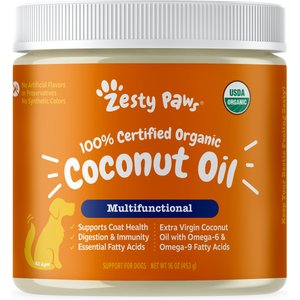Move over, olive oil: There’s a new healthy fat in town. Coconut oil is surging in popularity in humans and animals alike due to its health benefits.
From fresher breath to more energy, there are several health benefits of coconut oil for dogs. But how, exactly, are you supposed to get your dog to eat it? We dug into research and talked to a vet expert to get some helpful tips.
Is Coconut Oil Safe for Dogs?
Coconut oil is not only safe for dogs, but it also can be nutritionally beneficial.
“Coconut oil is a great source of healthy fats,” says Dr. Sarah Wooten, DVM, CVJ, consulting veterinarian for Big Barker and veterinarian at Sheep Draw Veterinary Hospital in Greeley, Colorado.
Dr. Wooten says this trendy ingredient may help your pet with everything from dry, itchy skin to digestion.
Here are the benefits of coconut oil for dogs.
It’s Rich in Fatty Acids
Specifically, coconut oil is rich in medium-chain fatty acids, or medium-chain triglycerides (MCTs), including lauric acid, capric acid and caprylic acid. It also contains some saturated fats.
Both are key components to pet nutrition and can support metabolism, increase good cholesterol, lower bad cholesterol, boost cognitive function and provide a healthy source of energy.
It’s Antimicrobial
Coconut oil also has antimicrobial, antiviral and antifungal properties, which means coconut oil may actually stop the spread of bacteria and viruses and limit the reproduction of yeast. Because of this, coconut oil—when consumed orally—may also help with bad breath, which is often caused by bacteria.
It Contains Antioxidants
Coconut oil contains numerous antioxidants, which fight harmful free radicals in your pet’s body. Because of this, benefits of coconut oil may also include faster wound healing and immune system support.
It May Help with Nutrient Absorption
Coconut oil may also alleviate digestive disorders, improve healthy gut flora and help absorption of fat-soluble vitamins. In both human and animal studies, medium-chain fatty acids in coconut oil have been shown to reduce gut inflammation.
It May Help Balance the Thyroid
Some experts say coconut oil can help balance the thyroid, which has an overarching effect on your dog’s health. Among other things, the thyroid plays a role in your dog’s metabolism and body weight. A healthy thyroid can help promote weight loss and properly regulate your dog’s body temperature.
If you suspect thyroid issues, coconut oil alone won’t be enough to fix the problem but talk to your vet about whether it makes sense as part of the treatment plan.
What Kind of Coconut Oil Can I Give My Dog?
Unrefined coconut oil (also called virgin coconut oil) is safe for dogs—particularly one that’s organic and cold-pressed.
Unrefined coconut oils are less processed and higher in antioxidants and polyphenols—beneficial plant compounds that are responsible for some of coconut oil’s superfood status.
4 Uses of Coconut Oil for Dogs
How do you actually give coconut oil to your dogs? There are multiple ways, from topical application to simply letting your dog lick a spoonful of the oil.
Apply It to Your Dog’s Skin
As it is rich in vitamin E, “coconut oil may address dry, itching skin,” says Dr. Wooten. That’s why one of the most popular coconut oil uses is as a topical application for skin condition, such as cracked paws, dandruff and “hot spots.”
From a practical standpoint, Dr. Wooten doesn’t typically recommend topical application of coconut oil, as she says most animals will track the oil onto your floors and furniture, or simply lick off the coconut oil. (“After all, coconut oil tastes good!” she says.)
That being said, massaging the coconut oil into your dog’s coat and skin can help reduce the potential rub-off—or at least allow your dog to reap some of the benefits—because a portion of the coconut oil will be absorbed.
For easier application, you can try a coconut oil-based paw balm. The Pet MD 3-in-1 Paw Wax combines coconut oil with shea butter, avocado oil, almond oil and cocoa seed butter—other ingredients that can help nourish dry skin.
Add It to Meals
Coconut oil can make your dog’s meals more palatable, so it’s a win-win. You can melt it and pour it over your dog’s kibble to soften it up or mix it right into wet or fresh food.
If you’re just starting out, limit the amount to ¼ teaspoon per day. Small dogs can stay around ¼-½ teaspoon per day, but you can work up to 1 tablespoon for larger dogs who are tolerating it well.
Make Dog Treats
Another way to get your dog to ingest coconut oil is to make your own homemade dog treats.
This peanut butter cup recipe combines coconut oil with two other simple ingredients: carob chips and peanut butter. And it comes together in minutes.
If you do make these, remember the 10 percent rule: No more than 10 percent of your dog's daily calories should come from treats. The other 90 percent should come from well-balanced dog food. That said, stick to just one treat per day. More than that can contribute to weight gain and digestive upset.
When making this treat, use natural peanut butter. Natural peanut butter is best because it usually contains just one or two ingredients (peanuts and sometimes salt), and it does not include added sugar or artificial sweeteners, like xylitol, which is very toxic to dogs.
Feed It to Them Directly
It may be less time-consuming (and less messy!) to have your pet directly consume coconut oil. Most dogs like the taste of coconut oil and will lick it right off a spoon.
It’s important to start with small doses, giving small dogs or cats ¼ teaspoon a day. Larger dogs can have up to 1 tablespoon.
My Dog Ate Too Much Coconut Oil, What Do I Do?
The biggest concerns with your dog eating too much coconut oil are digestive upset and weight gain.
Because coconut oil is so high in fat, it can be more difficult for your dog to digest. This can cause diarrhea and/or fatty, greasy stools, so use care when dosing it out.
Coconut oil is also extremely calorie-dense (about 120 calories per tablespoon), so it’s important that you use coconut oil sparingly to avoid weight gain in your pup. You should be extra cautious when giving coconut oil to overweight dogs.
One way to ensure you don’t overdo it is to use commercial dog food or treats with added coconut oil, rather than giving your dog coconut oil separately.
- This American Journey Dog Food is a kibble that contains wholesome ingredients such as sweet potatoes, blueberries and pumpkin, as well as a hearty dose of coconut oil.
- Primal Freeze-Dried Nuggets offer a wholesome shortcut to a raw-food diet. Tnuggets contain organic coconut oil with nutrients that mimic the natural bacteria found in the digestive tract.
- Evanger's Game Bird Recipe with Coconut Oil is a high-protein dog kibble that combines a duck and turkey base with digestion- and skin-supporting ingredients, like coconut oil and probiotics.
Coconut Oil Alternatives
Although rare, some animals can have allergic reactions to coconut oil. The high fat content of coconut oil can also cause diarrhea. If your pet is at risk for pancreatitis, coconut oil can do more harm than good.
If coconut oil isn’t a perfect fit for your animal, fish oils like salmon, anchovy and krill are good alternatives. These don’t have the same medium-chain triglycerides, but they’re rich in omega-3s, which contribute to skin, coat and brain health.
If you don’t want to give the oils directly, the Instinct Frozen Raw Bites Dog Food combines nutrient-dense ingredients, like beef liver, beef spleen and beef kidney, with salmon oil, blueberries and spinach.
Other ways to use coconut oil:
Share:
















